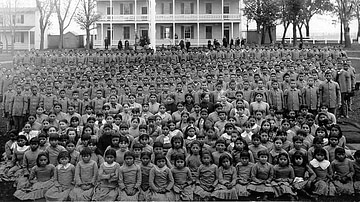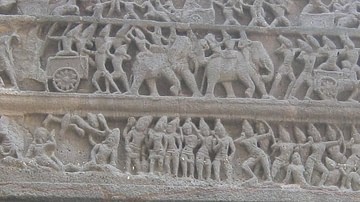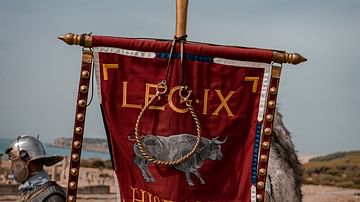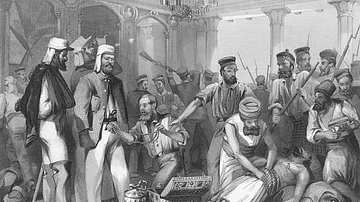Search
Search Results

Article
Buffalo and Eagle Wing & The American Indian Boarding School
Buffalo and Eagle Wing is a legend of the Plains Indians culture of North America, which is part origin myth and part cautionary tale on the importance of keeping one's promises. Although scholars agree on the general provenance of the tale...

Definition
Indian Massacre of 1622
The Indian Massacre of 1622 was an attack on the settlements of the Virginia Colony by the tribes of the Powhatan Confederacy under their leader Opchanacanough (l. 1554-1646) and his brother Opitchapam (d. c. 1630) resulting in the deaths...

Article
Elephants In Ancient Indian Warfare
Elephants were used in the ancient Indian army, irrespective of regions, dynasties, or points in time; their importance was never denied and continued well into the medieval period as well. The ready availability in the subcontinent of the...

Article
Chariots in Ancient Indian Warfare
The chariot was the elite arm of ancient Indian armies in the Vedic (1500 BCE – 1000 BCE) and Epic periods (described by the Ramayana and the Mahabharata, 1000-600 BCE) because of the advantages it conferred and the selection of plain ground...

Definition
Legio IX Hispana
Legio IX Hispana served with Julius Caesar in Gaul and against Pompey in the Civil Wars. Later, it fought alongside Augustus in his Cantabrian Wars and was one of the four legions Claudius took with him in his invasion of Britain in 43 CE...

Article
George Washington in the French and Indian War
The life and career of George Washington (1732-1799) were largely impacted by the French and Indian War (1754-1763). An officer of the Virginia Regiment, Washington's actions at the Battle of Fort Necessity and the Braddock Expedition helped...

Article
Cultural Links between India & the Greco-Roman World
Cyrus the Great (558-530 BCE) built the first universal empire, stretching from Greece to the Indus River. This was the famous Achaemenid Empire of Persia. An inscription at Naqsh-i-Rustam, the tomb of his able successor Darius I (521-486...

Image
British Soldiers Looting during the Sepoy Mutiny
An 1850s illustration showing British soldiers looting in Luknow during the Sepoy Mutiny (1857-8), an activity conducted by both sides during the rebellion.

Image
Mutiny on the Bounty Postage Stamps
A set of stamps issued in 1940 by Pitcairn Island commemorating the 1789 Bounty mutiny. Fletcher Christian led the mutineers to Pitcairn where they established a community.

Definition
Jallianwala Bagh Massacre - The British Atrocity at Amritsar
The 13 April 1919 Jallianwala Bagh Massacre (aka Amritsar Massacre) was an infamous episode of brutality which saw General Dyer order his troops to open fire on an unarmed crowd of men, women, and children trapped in an abandoned walled garden...